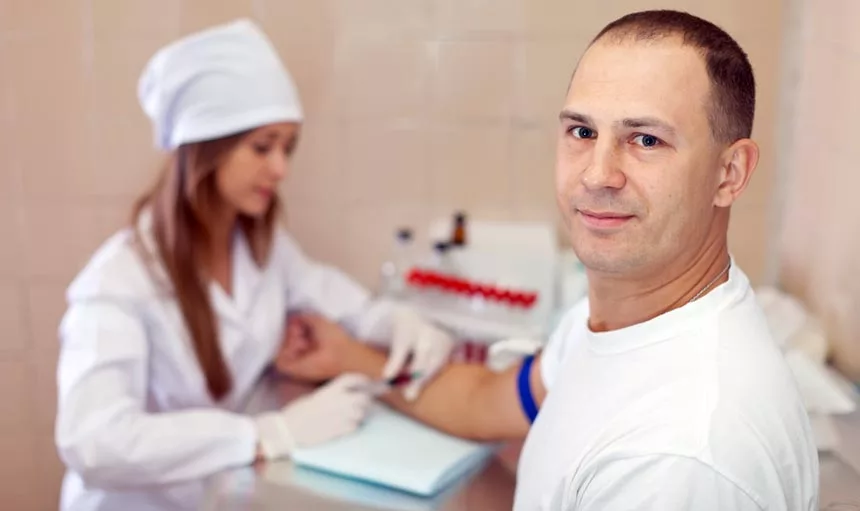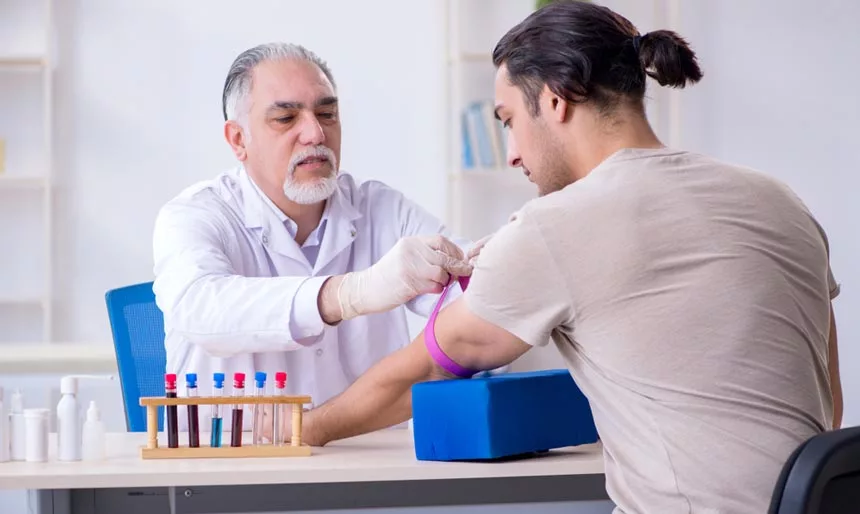Dealing With a Failed Drug Test
Table of Contents
- Dealing With a Failed Drug Test
- What Are Drug Tests Used For?
- What Happens if You Fail a Drug Test?
- Employee-Mandated Drug Testing
- What Happens If You Fail a Pre-Employment Drug Test?
- Can You Lose Your Job If You Fail a Drug Test?
- What Happens If I Fail a Court-Ordered Drug Test?
- The Next Steps After Failing a Drug Test
- Find Help To Stop Using Drugs Today!
- FAQs About What Happens If You Fail a Drug Test
Failing a drug test can have serious consequences, both professionally and personally. Testing positive for drugs can lead to the loss of a job, the denial of certain benefits, and even criminal charges in some cases.
For these reasons, it is important to understand what happens if you fail a drug test and how you can deal with this reality.
Keep reading to learn more about what happens if you test positive on a drug test, how to handle the consequences, and how you can get help to quit drug use today!
What Are Drug Tests Used For?

Drug testing is becoming increasingly commonplace in the workplace. Employers may test their employees to ensure a safe and productive work environment or as a condition of employment.
Drug tests are also commonly used by law enforcement officers, courts, and other government agencies. Random drug testing has been found to be effective for making sure governmental employees and service members are healthy and practicing safe habits.
What Happens if You Fail a Drug Test?
When someone fails a drug test, there are usually several steps that must be taken. Depending on the circumstances, the consequences can range from minor to severe.
If you fail a drug abuse test for a job or other government-related purpose, you may be subject to disciplinary action or even the loss of the job or benefit. Depending on the situation, you may also be required to attend drug counseling or treatment programs.
If you fail a drug screening test for criminal purposes, you could be subject to criminal charges. Depending on the type of drug and the amount detected in your system, you could be charged with possession or distribution (in the case of parole or probation on such charges).
Of course, the exact penalties you will face for faIling a drug test will vary based on where you live and under what circumstances you are taking the test.
Employee-Mandated Drug Testing

In today’s workplace, both scheduled and random drug tests are becoming increasingly common. Employee-mandated drug tests require employees to submit to drug screening in order to be or remain employed.
This may include a drug or alcohol test, which will typically screen for illicit drugs, such as recreational marijuana use, amphetamines, benzodiazepines, and other illegal drugs. If the employee tests positive, they may be questioned about their substance use.
For many businesses and employers, putting a random drug testing program in place is an effective way of maintaining a safe and productive work environment. Not only does job-mandated drug testing help protect employers, but it is meant to support employees as well.
Employees may also have to submit to an employer’s test if there is reasonable suspicion that they are using drugs at work. By having a testing policy in place, employers can discourage employees from using drugs in the workplace. This can help to create a safer and more productive work environment.
Furthermore, drug tests can help employers to identify employees and existing staff members who may be struggling with substance abuse problems and provide them with the resources they need to get help.
What Happens If You Fail a Pre-Employment Drug Test?
Failing pre-employment drug testing can have serious consequences for job seekers. It can mean the difference between getting the job and being passed over for someone else. Depending on the company’s policy, failing a pre-employment drug test can even lead to the job applicants’ disqualification from being considered for the position.
When a job seeker submits to a pre-employment drug test, the employer is typically looking for evidence of illegal drug use. This will usually involve a typical urine drug test which, if returned positive, the employer will have the right to reject the application for the job position.
In some cases, the employer may offer the applicant an opportunity to explain the results. If the applicant can provide a reasonable explanation for the failed test, such as positive drug tests for medical marijuana use or herbal supplements, the employer may still consider them for the role.
Of course, this is at the employer’s discretion and not guaranteed. It is also important to note that if the potential new employee fails these drug screening tests, the hiring manager may blacklist them, preventing them from gaining employment through this employer in the future.
Overall, it’s important for job seekers to understand the implications of failing a pre-employment drug test. In many cases, it can mean the difference between getting the job and having to look somewhere else.
Most importantly, it can serve as an eye-opener for your need to seek professional help to stop using drugs or alcohol and find work as a sober and healthy employee.
Can You Lose Your Job If You Fail a Drug Test?
The answer to this question depends on the employer’s policies and the laws of the state in which the employees work. In some states, there are additional steps employers must take before they can legally terminate an employee for failing a drug test.
The first step an employer must take is to ensure that the drug test was properly administered and that the results were accurate. They must also consider the current employee’s job duties and the potential impact of the employer’s drug use on their job performance. If you decide to seek treatment prior to (or immediately following) a failed drug test, the Families and Medical Leave Act or FMLA can help with rehabattendance and keeping your job safe and secure.
If an employer decides to terminate an employee for failing a drug test, they must ensure that the termination is consistent with their policies and the laws of the state in which the employee works. Some state laws may require the employer to offer their employee an opportunity to undergo a drug treatment program before the employee can be legally terminated.
What Happens If I Fail a Court-Ordered Drug Test?

Court-ordered drug testing has become increasingly popular over the past few decades as a means of monitoring individuals involved in criminal proceedings. These drug test panels are used to determine whether or not an individual is using drugs, and can be used to monitor the progress of individuals who are receiving drug treatment.
Urine tests that also incorporate EtG testing are the most common in this setting, and typically involve the collection of urine samples, which are sent to a laboratory for analysis. The laboratory will screen the sample for the presence of certain substances, such as cocaine, marijuana, methamphetamine, and other drugs.
If the sample tests positive for any of these substances, the individual will be subject to further legal proceedings. The results of court-ordered drug testing are typically used to determine the outcome of a criminal or civil case.
For example, if the results of a drug test reveal that an individual is using drugs, they may face criminal charges and jail time related to drug possession or distribution. They may also be required to pay fines and/or do community service.
Similarly, if the results of a drug test reveal that there are no drugs in a person’s system, they may receive leniency when it comes to sentencing. Overall, there are many possible outcomes for failing a drug test in a court setting.
The Next Steps After Failing a Drug Test
Failing a drug test can be a daunting prospect, especially if the test was unexpected or unplanned. Not only will the individual have to face the potential consequences of the failed test, but they will also have to figure out what to do next.
First, it’s important to assess the situation and understand the reason behind the failed drug tests. In some cases, the individual may have been unaware that they had drugs in their system. If this is the case, it will be important to identify where they came from, and how to prevent this from happening again in the future.
In other cases, the individual may have knowingly taken drugs, either recreationally or as part of a treatment program. In this case, their positive drug test result will have to be addressed, either through attending a drug rehabilitation program, seeking counseling, or fulfilling certain conditions set by their state or employer.
No matter the reason for the failed test result, it is important, to be honest, and open with any relevant parties. A failed drug test is not the end of the road. With the right resources and support, it is possible to move past this and develop positive strategies for avoiding drugs in the future.
The Best Defense After a Positive Test for Drugs
In many, if not most cases, the best defense for a positive drug test is an honest acknowledgment of using drugs and a commitment to get help. This is where the services of Find Addiction Rehabs come into the picture.
If you have failed, or know you will fail, an important drug test, reach out now and get options that can present you to your PO, employer, or other authority as someone who has taken the situation seriously and is seeking assistance, either through an EAP program or directly with treatment and using the FMLA to protect your job (we’ll review this protection coming up). It can make a world of difference in what happens next.
Find Help To Stop Using Drugs Today!

If you or a loved one is struggling with an addiction and want to get sober, the Find Addiction Rehabs team is here to help. Our hotline is available 24/7 to connect you with recovery programs and resources and answer all of your treatment questions.
We work with an extensive network of rehab facilities nationwide that can serve all of your recovery needs. Give yourself the chance you deserve and call now to get started on the path to becoming a happier, healthier, sober you!
FAQs About What Happens If You Fail a Drug Test
Is it Possible to Get a False Positive On a Drug Test?
Yes, false positives are possible when taking a urine test or any other kind of drug test. However, this is a very uncommon occurrence. In the event that you believe you may have received a false positive result, you may be allowed to take a second test to verify or negate the first, and should immediately request such a test if you believe this has occurred.
How Do I Avoid Failing a Drug Test?
In order to avoid failing a drug test, it is important to abstain from drugs and alcohol. If you have been using drugs, it is important to stop and allow enough time for any traces to leave your system.
It is also important to be aware of what types of drugs and alcohol are being tested for and when testing will take place. Some drugs, such as marijuana, can remain in your system for several weeks, so you should plan accordingly.
Finally, if you do fail a drug test, it is important to understand the consequences and take action to avoid them in the future. This will include seeking treatment for your drug or alcohol abuse and giving yourself a chance at sobriety.
Can I Lose My Job For Going to Rehab?
In most cases, you cannot be fired for going to rehab. The Americans With Disabilities Act (ADA) is a federal law that protects individuals with disabilities, including addiction, from discrimination in the workplace.
The ADA prohibits employers from taking adverse action against an employee, such as firing them, because of their disability or their need to seek treatment. This means that, in most cases, you cannot be fired for going to rehab.
Does Rehab Go On My Permanent Record?
The short answer is no, rehab will not go on your record. Addiction rehab programs are confidential and there is no legal requirement that participants must disclose their treatment. This means that employers, landlords, or anyone else will never know you were in rehab unless you choose to share this information.
Anna M. joined Find Addiction Rehabs with extensive experience in the field of addiction treatment. As a former Nurse Practitioner in Miami, she found her passion for addiction treatment when a family member was lost to his disease. With each article and resource, she hopes to save other families from experiencing the anguish of a loved one’s passing due to drinking or drugs.


